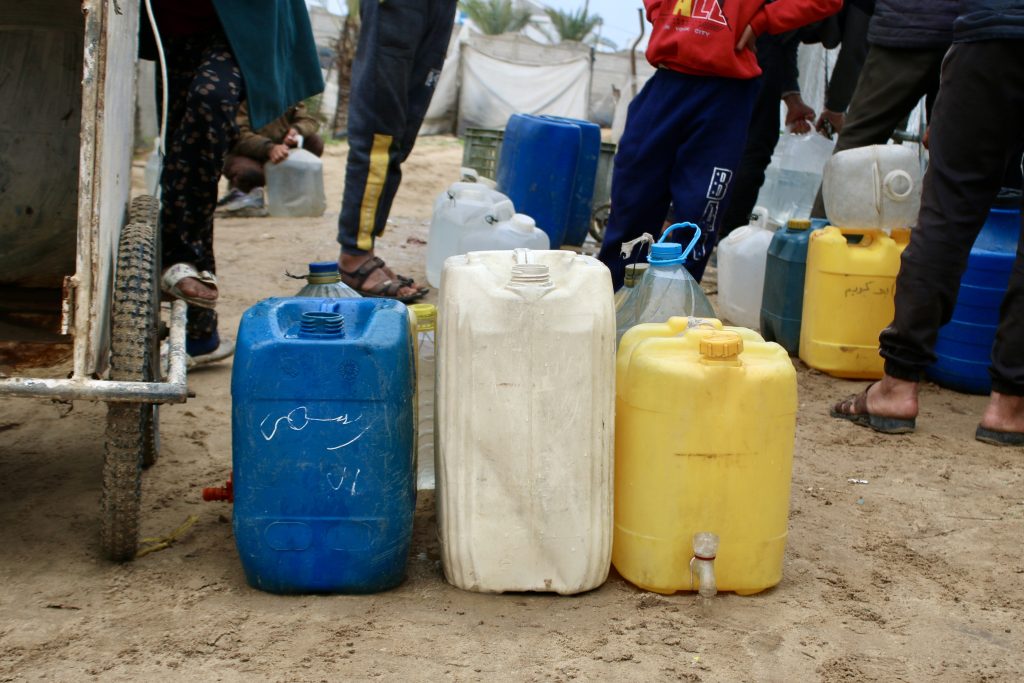JERUSALEM – In Gaza, Palestine, in the midst of a shattered ceasefire and more deaths, another tactic of war is playing out as Israeli authorities essentially block access to water by cutting electricity and fuel from entering Gaza, warns Médecins Sans Frontières (MSF) / Doctors Without Borders. As Israeli forces continue to rain down bombs on the Strip, MSF calls for the ceasefire to be immediately restored and for Israeli authorities to allow electricity to flow, along with the entry of aid, including fuel, and water and sanitation supplies, to avoid further loss of life.
Amidst the violence, if fuel runs out, the remaining water system will completely collapse, and all but cut off people’s access to water, leading to inhumane consequences for the millions of people who remain inside Gaza. Along with injuries and deaths from the fighting and bombing, access to safe water is having consequences on people’s living conditions and their health. In Al Mawasi and Khan Younis primary healthcare centres the three most common conditions treated by MSF, jaundice, diarrhoea and scabies, are directly caused by inadequate provision of safe water.
“The sheer number of children with skin conditions is a direct result of Gaza’s destruction and blockade,” says Chiara Lodi, MSF medical team coordinator in Gaza. “In addition to treating adults and children who have severe war injuries, our staff are treating an increasing number of children with entirely preventable skin diseases like scabies, which is not only uncomfortable, but in severe cases, sees them scratch their skin until it bleeds which can lead to infection. This is a result of children being unable to bathe, spreading scabies and other infections, leaving lasting scars.”

Even prior to missile strikes from Israeli forces earlier in the week that shattered the 2 month long ceasefire, Israel blocked all entry of aid into Gaza. As a result, humanitarian efforts to restore Gaza’s water system remain severely obstructed and delayed by Israel authorities’ “dual-use” pre-clearance system. Most water and sanitation supplies require pre-approval, including chlorine, essential spare parts for water desalination units, generators, borehole pumps, and water tanks.
“Restrictions by Israeli authorities have made it near impossible to restore a functioning water system,” says Navarro. “Water production relies on energy, yet new generators over 30 kilowatts are not permitted to enter. We’re forced to ‘Frankenstein’ generators—salvaging parts from one to fix another.”
MSF continues to call on Israeli authorities to lift its inhumane siege on Gaza, uphold international humanitarian law and its responsibilities as an occupying power, and to ensure an immediate and unhindered access of aid into the Strip.
GAZA’S WATER CRISIS AT A GLANCE
- Even before the latest attacks, Gaza’s water crisis, already dire due to Israeli cuts to electricity and water and the destruction of infrastructure, worsened after Israel’s authorities’ cut aid from entering Gaza on March 2 and on March 9 cut electricity. The main desalination plant in Khan Younis reduced output from 17 million to 2.5 million liters per day.
- From January to February 2025, MSF teams conducted over 82,000 primary health care consultations, almost a fifth of those related to conditions linked to lack of water and hygiene, including scalp infections and skin conditions such as scabies.
- Between January and mid March2025, MSF produced over 2 million of clean water and distributed over 36 million liters. Since the ceasefire, MSF started distribution in northern Gaza, including Jabalia camp, where aid was blocked for months.
- From January 2024 to early March 2025, of the 1,700 water and sanitation items requested by MSF under the dual-use system, only 28 percent were approved by Israeli authorities. Many items are in bureaucratic limbo, with responses from authorities averaging up to 60 days—some exceeding 200. Even approved supplies can still be turned away at border crossings. In November 2024, Israeli authorities approved an MSF desalination unit after an 85-day wait. However, despite weekly attempts since 5 February, the unit still hasn’t entered Gaza, as the trucks carrying it continue to be turned away at the border.












